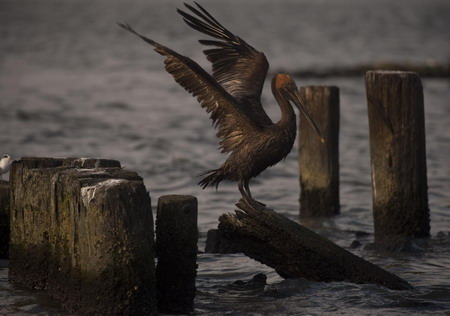Asia-Pacific
Louisiana leaders want Gulf drilling to resume
(Agencies)
Updated: 2010-06-11 10:51
 |
Large Medium Small |
|
|
NEW ORLEANS -- At the same time they are venting their fury on BP over the Gulf of Mexico spill and its calamitous environmental effects, Louisiana politicians are rushing to the defense of the oil-and-gas industry and pleading with Washington to bring back offshore drilling, now.
As angry as they are over the disaster, state officials warn that the Obama administration's temporary ban on drilling in the Gulf has sent Louisiana's most lucrative industry into a death spiral.
They contend that drilling is safe overall and that the moratorium is a knee-jerk reaction, akin to grounding every airplane in America because of a single crash. They worry, too, that the moratorium comes at a time when another major Louisiana industry, fishing, has been brought to a standstill by the mess in the Gulf.
Meanwhile, a government task force of scientists said that before BP cut and capped the blown-out well at the bottom of the sea a week ago, it was spewing 2.1 million gallons (8 million liters) of oil per day, or twice as much as the government's previous worst-case estimate.
The oil-and-gas industry is the backbone of the Louisiana economy, bringing in billions of dollars in revenue for the government and accounting for nearly one-third of the nation's domestic crude production.
It took a heavy blow when the government imposed a six-month offshore drilling moratorium in the wake of the spill that has sent upwards of 50 million gallons (190 million liters) of oil into the Gulf in the biggest environmental disaster in US history. The government imposed the ban while it reviews the safety of deepwater drilling in light of the BP disaster.
Louisiana lawmakers have railed against the moratorium, saying it could put more than 100,000 people out of work, shutter businesses and destroy livelihoods. A bill asking the administration to shorten the moratorium passed the Legislature unanimously.
But persuading the administration to take such action could prove to be extraordinarily difficult at a time when globs of oil are fouling marshes and beaches, images of oil-soaked birds are a fixture in the news and no apparent end to the spill is in sight.
Interior Secretary Ken Salazar has acknowledged the potential damage to energy companies and their employees and promised a Louisiana senator the administration would demand that BP compensate businesses for their losses.
The moratorium put a halt to the 33 deepwater exploratory rigs in operation in the Gulf in addition to all new deep-sea drilling permits. Platforms that are already producing oil along with rigs in shallow waters are allowed to remain in operation.
"Every one of these deepwater wells employs directly hundreds of people and indirectly thousands," said Sen. Mary Landrieu of Louisiana. "This is one company. This is one well. It's a terrible situation and no one is making light of it, but what I'm saying, as strongly as I can, to this president is the economic analysis is devastating to many companies, thousands of companies.
BP hopes that it can stem the flow of oil soon and remove some of the heat that has been put on the company and energy industry by politicians, the American public and investors, who have dumped BP stock and driven its price down to the lowest level in 14 years out of fear that the spill could spell the company's ruin.
BP is capturing more oil from the bottom of the sea each day, and expects to siphon even larger quantities by early next week once more heavy equipment arrives. Coast Guard Adm. Thad Allen, who is overseeing the crisis for the government, said BP could be taking in 1.17 million gallons (4.5 million liters) a day by next week, up from the current daily rate of 630,000 gallons (2.4 million liters). Meanwhile, President Barack Obama on Thursday met with the families of the 11 rig workers who were killed in the April 20 explosion.





